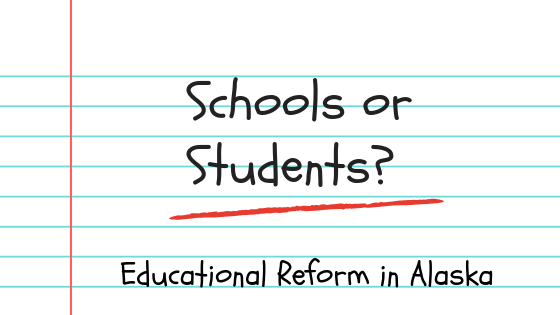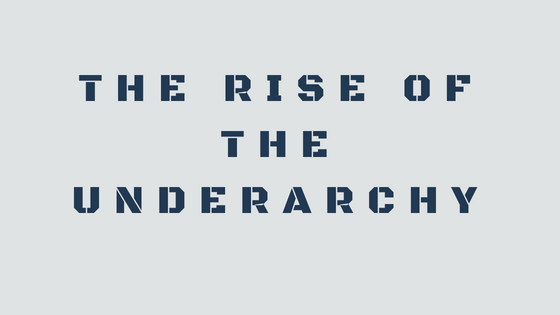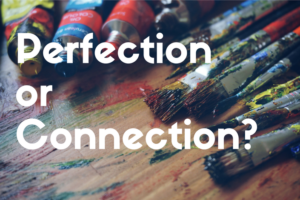It sounds really altruistic and selfless to forgo a PFD in favor of education. I mean, after all, it’s all about the children. And a cut to education seems very much like an affront to children everywhere. How could Governor Dunleavy be so cruel?
But let’s calm down and take a step back for a moment. When we use the word “education” what are we really talking about? As a former public school teacher, “education” brings to mind to a myriad of activities— only a fraction of which were devoted to actual learning. I used to think, “If I only had enough time to actually TEACH as a teacher, I could accomplish so much more.” I realized that teachers like me were doing the best they could under the circumstances. It was the circumstances that bothered me. There were extra-curricular responsibilities, there were very detailed expectations, there was school spirit, there was new technology, new school wide initiatives, meetings, the inevitable behavioral issues— the list went on and on. I realized that much of the theory I had been taught in my college courses was very difficult to actually accomplish in this type of environment.
The problem I found was that the educational system I was a part of had become somewhat of a beast. You know how it is. Most of you have attended public school at some point in your life. School is generally all about the system. All about getting to your class on time, all about getting the assignments in, all about the grade, understanding expectations, surviving socially. Only precious few moments was it about your interests, your capacity, the rate you needed to learn, or who you were going to become. I know it sounds like I’m dogging on schools, but I’m not. I’m sure there are many great public schools and maybe some of you are part of them. We should reward thriving schools, and I’ll get to that in a bit.
In industrial age of our nation, public schooling was patterned in such a way that its purpose was to train people to work in factories. Everyone learned the same basic skills and were put into neat little rows with cookie cutter expectations. Today, as much as we try to spice up the system, the system (as systems do) has remained largely the same. The more the system grows, the more money we feed it— the more of a beast it becomes. Subtly the children, and even parents, are there to serve the beast and not the other way around.
I know we don’t like to talk about it, but there is very real politicking that goes on in schools, such that it makes it hard for educators or parents to make bold changes in favor of student outcomes. As the monolith beast grows, more rules and red tape gets rolled out. In order to put all those directives in place, more support staff are hired. The more support staff are hired, the larger the beast grows.
I am a valley girl— from the San Fernando Valley in LA county, California. For my first four years of school, I attended the LA Unified school district. A school that poured tons of finance into their schools. And yet, you wouldn’t know to look at it. We had short blue pencils with no erasers. There was one eraser on a rope that 5 desks of students shared. The soap in the bathroom was grainy and rough—they couldn’t even afford liquid hand soap. The playground was more like a war zone and I was terrified to enter the bathrooms during recess. This was not a place where I could thrive. I realize that this is extreme, and not at all what schools are like here.
My point is that I’ve seen firsthand how more money does not equal better education. We have seen that we as a state that have invested more money into our education than most states in the union— with very little to show for it. If you hired a mechanic to fix your car and saw no change, but actually left your car worse off than when you handed it over to him. You wouldn’t agree to give him more money, you’d take your money elsewhere.
It’s time that we parents and citizens alike stop falling for the line that funding “education” is the same thing as funding learning. Let’s call it what it is. What we are really talking about is school funding, and in many cases “beast feeding.” And it’s not that we should halt all funding to all schools, but we should begin thinking about new strategies for student success. We should be funding the schools where parents see their kids thriving. Yes, I’m talking about school choice. I know we have great school choice options in Alaska. Great! I am thankful. But we can do better. We can leverage school choice to solve our educational crisis.
What do we have to really measure public schools? Test scores. Test scores have their place, but test scores are limited. Who knows whether their kids are thriving in their environments? It’s the parents. When we move toward school choice options, parents get to put their money where the learning is.
Instead of blindly relying on the failure of the beast, it’s time for us independent Alaskans to roll up our sleeves and begin opening our minds to creative possibilities for how we are to train the next generation of thinkers. I applaud Governor Dunleavy on his commitment to empowering students and their parents with school choices. Maybe now is the perfect time for a radical overhaul of the system that has become the beast.
In Alaska we spend upwards of $20,000 per child for one year- the second highest in the entire US. Parents, can you imagine what you could do with that money if you had the choice to educate your children the way you saw fit? Or even half of those funds?
Instead many of you are made to feel guilty if you don’t seem as though you are “supporting the school.” Never feel guilty for putting your child’s learning concerns ahead of the school system. Alaskan parents of public school students need to rise up and say, “Enough is enough. We should have the rights as individuals to decide where and how our kids our educated, regardless of our resources.”
We know that Alaska is very supportive of homeschooling. If you register with a homeschool charter, you can get funding for your child’s education. It’s only a few thousand a year (a mere fraction of what the public school spends), but it’s very helpful for struggling families. A few years ago a study followed Alaskan homeschoolers who were low income and what they found was that, compared to higher income families, the low income students gained the most from those homeschool funds being directed right into their homes. Think about it. They are surrounded by books and curriculum that hasn’t been there before. The results are particularly pronounced in reading, which is the area that has been our biggest educational deficit. Maybe parents opt to use the funds to take an online class or get a tutor. Maybe it’s just peace and quiet that they need away from all the school drama, to get a chance to get more rest in the mornings— that they are really able to thrive. We don’t have all the reasons for why they excel, but the data is clear that they do.
And it’s not just homeschoolers. All over the nation, we find that the more school choice options there are, the better lower income students fare. See this simple slideshow for the data. Countries around the world are benefitting from the success of schools who are competing for the privilege to educate each child. Many families cannot put the time into educating their children at home, but they could be empowered to choose any school they desired that was the best fit for their child.
Now, let’s join that conversation with the one about PFDs. The fact that PFDs are given to every person in the state is rare but wonderful part of our way of life here in Alaska. It celebrates the empowerment of the individual. In Alaska, the PFD empowers families. Some families put away their PFDs for their child’s continuing education. Some families use the PFD to go to work right away to pay bills and put food on the table. PFDs benefit families, benefit the economy, and give power to the individuals INCLUDING the children of Alaska.
Making cuts in school funding is not hurting children— not unless we let it. Sure, it might hurt administrators and superintendents and all those who’ve come to rely on the school for its financial reason for existing, but it won’t harm our students unless parents decide it will. It doesn’t need to hurt teachers, unless teachers buy into the line that it will. As a teacher who cared about real education and real learning outcomes for students, I longed to get out of “the system” and work in a place that was on the cutting edge of educational strategies. I longed to leave the establishment and embrace a long overdue step forward in educational advancement for a new generation.
It doesn’t have to be all about the government or the school board or even about test scores unless we want it to be. It’s about educational outcomes for each individual student. Some students thrive on competition, while others loathe it. Some students are made for engineering while others are made to stand on a stage and perform. If we continue to feed the voracious beast, who knows what genius we will have left untapped? Who knows what passions will be silently snuffed out? Let’s feed our kids what they need instead.
We are in both an educational and a financial crisis in Alaska. Perhaps this is a great opportunity for the government to agree with our willing Governor to step back a little and give power back to Alaskans and watch us solve each of these crises for ourselves.







